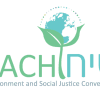By Rabbi Regina Sandler-Phillips The words of the Shema call for love of God “with all your me’od.” Me’od ordinarily means very-much, and is generally translated in the Shema as strength, might, or power. But ancient rabbis understood this power quite specifically: “Love God with all your money.” Money circulates—often inequitably, but it’s always moving among us. Talmudic rabbis, observing their own generations of changing fortune, declared poverty to be “a wheel that revolves in the world.” Given all the uncertainties of the financial wheel in spin, they called for regular attention to distributive justice: “Just as each small metal scale joins into a great armor-plate, so with tzedakah each and every coin joins into a great heshbon.” The Jewish ethical principle of heshbon (accountability) provides an immediate connection between ecology and economy, spirituality and social change. Every time we open our wallets or check our bank balances, we face choices of heshbon—and heshbon hanefesh ( “soul accounting”) includes personal finance. How are we literally spending each day of our lives? Rooted in the agricultural imperatives of the shmita cycle is a practice of heshbon accessible to all of us. The release of debts in the sabbatical year originally followed six years of regular tithing. No longer a form of […]
Topic: Tzedek/Justice

Because Sometimes it Rains on Your Sukkah
by Sarah Chandler Geshem Be’ito (Acceptance of Rain in Its Time) The following essay will be published in the forthcoming book of teachings “Good Noticing” published by the Institute for Jewish Spirituality. The rhythms of the Jewish calendar may not coincide with your particular climate. At times, our traditional rituals may range from the impractical to the impossible. For example, in the Northern Hemisphere, calling upon light in the darkness of Chanukah in Kislev/December always resonates, but singing about blossoming trees in Shevat/January may not make sense. How can we stay true to our tradition when the weather doesn’t cooperate? And as mindfulness practitioners, how might we elevate the news of undesirable weather? Those of us who live in the Northeastern United States are usually blessed with bountiful precipitation year-round. Furthermore, our religion is no longer based on the careful balance between following God’s laws and receiving in return enough rain for our crops to survive. The Reform movement even removed the second paragraph of the Shema from prayer books to make the bold statement: we are modern Jews—we do not believe that we can influence God to change the weather by keeping the commandments of our tradition. Recent evidence […]

Roseanne Barr and What Can Happen When We Teach about Shmita
Dear Friends, The story of Hazon is often a story about stories. Next week, on Tuesday, April 1, at the Green Building in Brooklyn, we’ll be telling the stories of four incredible inductees at our 3rd annual If Not Now Benefit, honoring the powerful stories of Rabbi David Ingber, Barbara Ribakove Gordon, the Margulies Family, and Margot Seigle. It’s going to be a wonderfully fun and meaningful evening, and, if you are in the New York area, I hope you’ll join us. But, for now, I want to share an unbelievable story that happened during our recent Purim Retreat at Isabella Freedman with Roseanne Barr. In the last decade of the 20th century, Roseanne Barr brought the issues and concerns of working class America to life through her groundbreaking sitcom “Roseanne.” At our Purim retreat, it was Roseanne Barr once again bringing concepts to life, this time in such a powerful and profound way that it literally changed the lives of some of those in the room with her. One of Hazon’s current points of focus regards creating a renaissance around the Jewish concept of shmita, the sabbatical year described in the Torah and other Jewish texts, which is scheduled […]

Roseanne Barr Invokes Jewish Values to Change Lives
Roseanne Barr invoked Jewish values to change lives at an innovative, enlightened, and provocative Purim retreat at Isabella Freedman this past weekend. In the last decade of the 20th century, Roseanne Barr brought the issues and concerns of working class America to life through her groundbreaking sitcom “Roseanne.” This past weekend, it was Roseanne Barr once again bringing concepts to life, this time in such a powerful and profound way that it literally changed the lives of some of those in the room with her. Roseanne served as the leader for a gathering at the Isabella Freedman Jewish Retreat Center in Falls Village, Connecticut, for the Jewish holiday of Purim, one of many holidays celebrating a great story of redemption. The Isabella Freedman Jewish Retreat Center is a campus of the organization Hazon, a Jewish non-profit with the mission of creating a healthier and more sustainable world. One of Hazon’s current points of focus regards creating a renaissance around the Jewish concept of shmita, the sabbatical year described in the Torah and other Jewish texts, which is scheduled to begin on Rosh Hashanah of 2014. A rarely recognized tradition, particularly outside of Israel, the idea of shmita includes not only […]

Inside the Activists’ Studio 2012: Finding Your Voice in a Global Movement
Join us to learn from and be energized by local Jewish change-makers and to celebrate the multitude of ways we are working to create a more just world.
![[Video] Siach: A Jewish Conversation on Social Justice A Jewish Conversation on Social Justice](https://hazon.org/wp-content/uploads/2012/01/siach-conversation-social-justice-100x100.jpg)
[Video] Siach: A Jewish Conversation on Social Justice
While on a big mission, like repairing the world, you sometimes forget why you’re doing whatever it is you’re doing.
Incorporating Social Justice into Jewish Education
This panel discussion was recorded at JESNA’s Enriching LIFE Fellowship seminar in July 2011
Videos from Siach
Siach: An Environment and Social Justice Conversation is a network of activists and professionals in the Jewish community from the USA, Israel, and the UK.

Applications for 2nd Annual Siach Conference Now Open
Siach, an Environment and Social Justice Conversation: A unique opportunity to meet, share and collaborate with fellow social justice and environment activists
Care to Share Gathers Over One Ton of Food
Originally posted in UJA Federation’s news. Try to picture 3.3 million grains of rice. If that’s too challenging, you could also visualize 200,000 grapes, 35,000 eggs, 4,000 pomegranates, 440 watermelons, or 220 pumpkins. Each of these quantities of food weighs a solid ton, which is the amount of fresh produce collected during UJA-Federation’s first annual Care to Share fresh food drive in conjunction with Met Council, Hazon, and AmeriCorps. (more…)

Care to Share
UJA-Federation of New York — in collaboration with Met Council, AmeriCorps, and Hazon — invite you to participate in our first annual Care to Share citywide and volunteer fresh produce drive. Care to Share will take place from Monday, October 3 – Tuesday, October 18, 2011, encouraging volunteers to symbolically fulfill the Jewish custom of gleaning, a custom tied to the harvest season and the Sukkot period. Traditionally, farmers leave the four corners of their fields unharvested so the needy can glean from the fields with dignity. (more…)

Food Conference Round Up
The 6th annual Food Conference begins this Thursday in sunny Davis, California. We wanted to take a moment to pull together all the wonderful things going on in the world in preparation. Daniel Infeld notes the momentum around the food movement and highlights Hazon’s Food Values taken into consideration when planning an event, program, or meeting on The Jew and the Carrot. Nadia Schreiber highlights how trendy DIY shechting has become and where it’s happening. Can the Food Conference take credit for starting this one? (more…)

Chewing on Food Justice: Fruits of Our Labor
Everyone’s talking about “food justice” these days, but what is it – really? What are all the pieces at play? How do they all connect? In what ways does “food justice” reflect our Jewish social justice values? And what are the best ways to plug in and take action? Whether this conversation is new or familiar to you, we hope you’ll join us for Chewing on Food Justice, a break down of our broken down global food system. Chewing on Food Justice: Fruits of Our Labor Join us for the third session of the series to learn about workers rights across the food chain. While food workers are some of the most exploited workers in the global economy, they are also leading up some of the most creative and effective organizing campaigns to improve their conditions and bring about a truly fair food economy. Their struggles remind us that a sustainable food system can only be achieved when the people harvesting, packaging, preparing, and serving our food are treated with respect. Our Jewish values demand it and our collective moral compass compels us to work toward it. Come and learn about some of their dynamic efforts and find out how you, […]
170 Jewish Social Justice Leaders to Meet With Obama Administration
FOR IMMEDIATE RELEASE 170 Jewish Social Justice Leaders to Meet with Obama Administration Washington, D.C.; July 27, 2011—On Friday, July 29th, 170 representatives of organizations that are part of the Jewish Social Justice Roundtable (JSJRT) will travel to the White House for a policy briefing to exchange ideas on housing, healthcare, food justice and education. The JSJRT is a group of 21 nonprofit organizations promoting economic and social justice as a core tenet of Jewish life. “Many people think the Jewish community has only one message to bring to Washington and it’s about Israel,” said Rabbi Jennie Rosenn, director of the Jewish Life and Values Program of the Nathan Cummings Foundation, which funds the JSJRT. “In reality, the Jewish community is deeply involved in issues of social justice here and around the globe. We are so pleased to have been invited to discuss these issues with the White House staff as we work to create a more just world.” Some participants are eager to tell White House officials about the public housing tenants in Chicago who teamed up with local organizations to renovate hundreds of uninhabitable apartments for low-income residents. Others want the Administration to hear how a Jewish community […]

Food Conference Presenter Highlight: Hazon Meets Mazon
Abby Leibman, President & CEO, MAZON Apart from having names that are routinely confused for each other, Hazon and MAZON are on the same page when it comes to food justice and inspiring the Jewish community to work towards healthier and more sustainable communities. We’re thrilled that Abby Leibman, the new President and CEO of MAZON, will be one of our Food Conference presenters this year. MAZON: A Jewish Response to Hunger is a national nonprofit organization dedicated to preventing and alleviating hunger among people of all faiths and backgrounds. “I love that so many teens donate to MAZON as part of their Bar and Bat Mitzvahs,” Ms. Leibman told Hazon recently. “I want to make sure that they understand why their efforts are so important. How is it that we have so many food-insecure people in the wealthiest country in the world? The first steps are finding a way to understand who is hungry in America, the magnitude of the situation and its causes. Then, community organizing and people teaching each other about the causes of hunger can help to bring about meaningful change. This is something I’m really excited to bring to my work at MAZON and my […]



